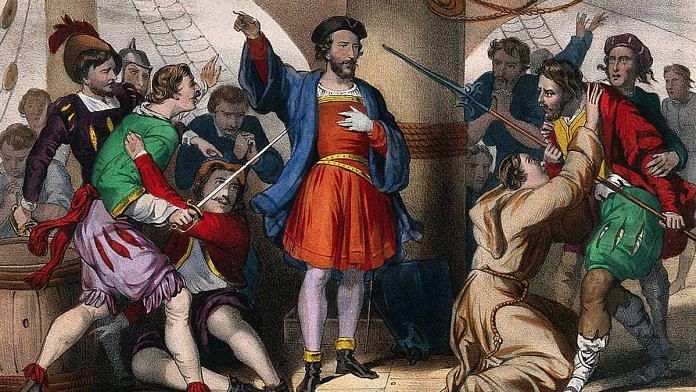New Delhi: Long before Italian explorer Christopher Columbus discovered America, sailors from his hometown may have already been aware of its existence, new analysis of 14th-century documents reveal.
Medieval Latin literature experts from the University of Milan, while transcribing a document dated 1345 and written by Galvaneus Flamma, a friar from Milan, realised that a passage in this ancient essay refers to an area we know today as North America.
The essay, first discovered in 2013, suggests that sailors from Genoa, Columbus’ hometown, were already aware of this land called Marckalada — as America first finds mention in the Mediterranean region.
According to Paolo Chiesa, one of the authors of the study, this is the “first known reference” to the continent in the Mediterranean area.
The findings were published in the journal Terrae Incognitae ahead of Columbus Day 2021 (11 October), which marks the anniversary of Columbus’s arrival in the Americas in 1492.
Galvaneus is known to have written several literary works in Latin, mainly on historical subjects. The document analysed in this study, Cronica niversalis, is thought to be perhaps his last work.
The document aimed to detail the history of the whole world — from ‘Creation’ to 1345, the year of publication. However, it was left unfinished.
Also read: Indian-Canadians ‘strongly skew Left’, remain with Trudeau-led Liberal Party, survey shows
Why Genoa was the first to get the news
According to Chiesa, Genoa would have been a “gateway” for news about new worlds. Galvaneus appears to have heard of seafarers’ rumours about lands to the extreme north-west, as well as information about Greenland, which he details accurately.
“What makes the passage (about Marckalada) exceptional is its geographical provenance: not the Nordic area, as in the case of the other mentions, but northern Italy,” Chiesa said in a statement.
Chiesa notes that throughout Cronica Universalis, Galvaneus declares where he has heard of oral stories, and backs his claims with elements drawn from accounts belonging to previous traditions on different lands.
“It has long been noticed that the fourteenth-century portolan (nautical) charts drawn in Genoa and in Catalonia offer a more advanced geographical representation of the north, which could be achieved through direct contacts with those regions,” he added.
Although there is no evidence that Italian or Catalan seafarers ever reached Iceland or Greenland at that time, the Genoese might have brought back to their city scattered news about new lands that they heard in the northern harbors from Scottish, British, Danish, Norwegian sailors with whom they were trading.
Cronica universalis, written in Latin, is still unpublished. However, an edition is being planned for a scholarly and educational programme promoted by the University of Milan.
(Edited by Paramita Ghosh)
Also read: Former PLA commander responsible for border with India dies from gastrointestinal issues: Report



